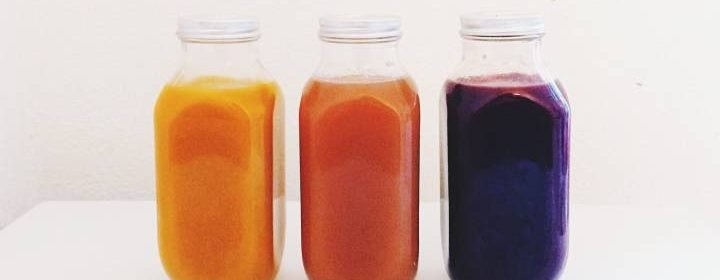Juice cleanses are not ‘harmful or beneficial,’ so why are they popular?

It’s 2019 and many of us are looking for ways to start the new year with a clean slate. For some, this means hitting restart on their diets by doing a juice cleanse.
A juice cleanse can vary. It can be a paid program that offers a week’s worth of juices (for prices that range over $200) or a homemade fast that last a few days. Either way, some people switch to juice-only diets as a way to “detox.”
“Following an all-or-nothing approach to your diet may work for some people, but it’s important to understand the limitations,” said registered dietitian Anar Allidina.
“Most detoxes out there are usually low in protein, healthy fat, calories, and fibre. Sure, you get vitamin and minerals but you aren’t getting balanced nutrition that you body needs to thrive.”
Clinical dietitian Rosanna Lee of MCI Medical Clinic in Toronto, added that for the average healthy person without medical complications, a short-term juice cleanse is neither harmful nor beneficial to their health. But she does see the appeal of it.
“For some, juice cleanses may be one way to introduce a form of vegetables and fruits into the diet,” she told Global News. “Vegetable and fruit-based juices do offer a source of vitamins, minerals and fluids that are beneficial for the body. Weight loss may be seen in the short-term just because we are cutting calories from foods we typically eat.”
Not always recommended
Allidina added anytime you cut certain groups of food, weight loss will occur, “but remember: drastic weight loss increases the chances of gaining the weight back,” she said. “Many juice or smoothie diets are very low in calories, ranging from 600 to 800 calories a day, making it extremely difficult to sustain over a long period of time.”
Dr. Yoni Freedhoff, director of the Bariatric Medical Institute in Ottawa, previously told the Canadian Press that juice cleanses are often shortcuts that don’t have long-lasting health benefits.
“When it comes to the concept of detoxification or toxins, it’s a completely made-up concept,” he said. “Our body really does already have incredibly, wonderfully powerful systems to help keep ourselves healthy – our livers and our kidneys do a remarkably good job.”
Instead of a week-long juice cleanse, Freedhoff added, focus on getting weekly exercise, cooking your own meals and getting enough sleep. “If you want to consume more fruits and vegetables for your health, that is a great plan, but you have to actually eat them.”
Can juices detox the body?
The word detox is often associated with juice cleanses, but Allidina said the best way to naturally support your organs and flush out toxins is by increasing your fibre intake.
“Fibre is crucial since it acts like a sponge in our body and absorbs excess fat, sugar and toxins, which pass through our GI tract for elimination,” she explained. “Fibre keeps you regular and helps support your gut bacteria. Having a healthy gut bacterium is the key to good health.”
She added that sugar, unhealthy fats (such as trans fats), alcohol in addition to stress and lack of sleep can offset your gut bacteria.
“The best way to fix this is to add fibre-rich foods to your diet, such as berries, avocado, dark green vegetables — especially those in the cruciferous family — whole grains, nuts and seeds.”
What to keep in mind
Knowing this, experts understand why juice cleanses are enticing: they still offer nutrients from fruits and vegetables and could lead to weight loss quickly. There is also an abundance of juice cleanse subscriptions in the market, making it easy for beginners to try.
“If you are adamant on going through a juice cleanse program, make sure to check for foods or ingredients you may be allergic to or intolerant of,” Lee said. “Some individuals have what is known as an ‘oral allergy syndrome’ (OAS) upon exposure to some fruits and vegetables. OAS often targets the mouth, lips, tongue and throat and is related to allergic rhinitis. If you have reactions to certain produce, these may be ones to eliminate from your juices.”
Look at prices as well as your schedule, as not all juice cleanses can fit with your life.
“Some programs establish specific times in which you should be drinking the juices, so make sure that the timing works for your daily routine. The program should also fit your budget reasonably,” Lee said.
Look for juices with fibre, proteins and healthy fat, Allidina added.
“Your body uses protein to build and repair tissues,” she said. “Protein is also required to make enzymes and hormones. Protein is an important building block of bones, muscles, cartilage, skin, plus it takes longer to digest and contributes to feeling full after we eat.”
And make sure the company you are purchasing a subscription from is transparent. Some reviewers, especially online, will also describe the side effects of the cleanse, as well as whether or not it worked.
“[These companies should] list their nutrition information and ingredient list so you know exactly what you are getting,” Alldina said.
Lee suggests speaking to a dietitian to ensure there are no potential risks to participating in the program.
“Some juicing programs support the use of laxatives or some other form of bowel stimulant, so always check with your healthcare provider first to ensure that the dosing level is safe,” she said. “Given that juicing cuts calories considerably, you may also want a healthcare provider to help you keep track of your weight changes over time.”
— with files from the Canadian Press
Source: Read Full Article

